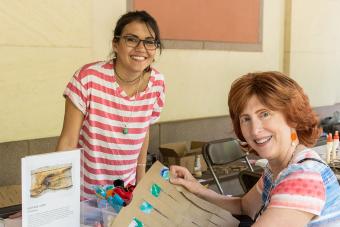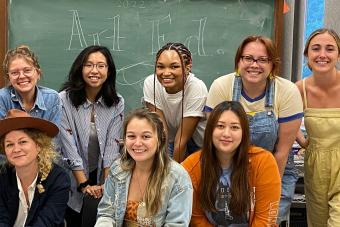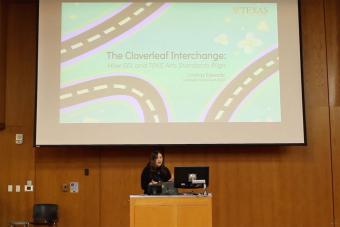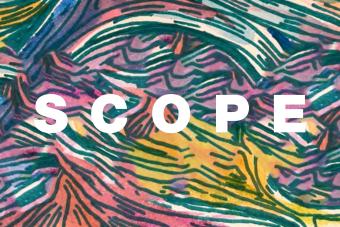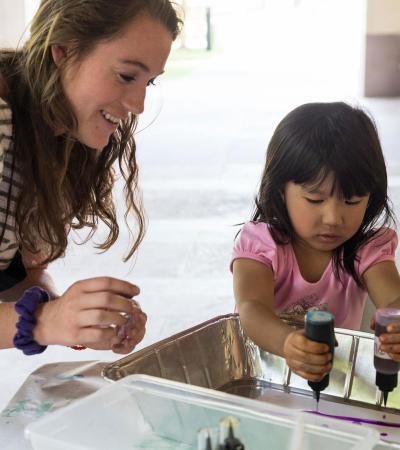
MA in Art Education
NOTE
The program will not be accepting applications during 2025-26 for the 2026-27 year.
The graduate Art Education program offers a rigorous and highly regarded master’s degree plan that is distinctive in its options for curricular focus. A comprehensive set of core courses provide a foundation in general arts instruction that is enhanced by focused study in one of three areas: Art Education in Schools (certification/non-certification), Art Education in Museums, or Art Education in Community-Based Programs.
When entering the program, students elect one of these options and explore its professional realm in-depth through specific coursework and at least one professional internship. All students ultimately conduct significant research on a topic in art education that culminates in a written thesis.
Degree
Program Tracks
Option A — Schools (Non-Certification)
For students wanting to enhance their knowledge of art education at the elementary and secondary school levels
Option B — Museums
For students interested in learning about and working in the field of art museum education
Option C — Community
For students desiring to investigate and conduct professional activities in community-based art organizations
Option D — Schools (Plus Certification)
For students interested in enhancing their knowledge of art education at the elementary and secondary school levels and leading to Texas all-level (P–12) art certification. *Note: additional Texas SBEC certification requirements include passing state certification exams, background check and fingerprinting.
Coursework Requirements
Completed by all Program Tracks (Options A, B, C, D)
- AED 381G: Foundations of Art Education (3 credit hours)
- AED 381K: Contemporary Issues in Art Education (3)
- AED 382G: Introduction to Research in Art Education (3)
- AED 382H: Thesis Proposal and Preparation (3)
- AED 386: Internship and Field Study (3)
- AED 698A/B: Thesis A/B (6) – or – AED 382L: Applied Project (6)
- Approved Art Education elective (3)
- Approved non-Art Education electives (6)
Additionally completed by Option A — Schools (Non-Certification)
- One of the following:
- AED 384: Art in Public Places (3)
- AED 384: Curriculum Development in Art Education (3)
- AED 384: Objects, Spaces, and Meanings (3)
- AED 388D: Art and the Creation of Meaning (3)
Additionally completed by Option B — Museums
- AED 383J: Museum Education: History and Theory (3)
- AED 383K: Museum Education: Practice and Application (3)
Additionally completed by Option C — Community
- AED 387C: Case Studies in Community-Based Art Education (3)
- AED 387D: Program Development in Community-Based Art Education (3)
Additionally completed by Option D — Schools (Plus Certification)
- One of the following:
- AED 384: Art in Public Places (3)
- AED 384: Curriculum Development in Art Education (3)
- AED 384: Objects, Spaces, and Meanings (3)
- EDC 331 (3), EDC 332 (3), and EDC 350E (3)
Course Descriptions
AED 381G: Foundations of Art Education
Required core course for all first-year graduate students
This class explores some of the foundational writings and beliefs that comprise the field of art education. Through readings, lecture, and discussion, students are introduced to past literature, perspectives, and understandings that make up this professional area of study. The course examines various purposes and practices of art education in the United States from the colonial period until the mid-1960s, with particular focus on the origins and changes of art education within the public schools of the United States. Art education is examined within the contexts of school and society, as a way to recognize the role this subject has played within these larger educational and social frameworks. Attention is directed toward looking into the lives of prominent people and noted historical events within art education, as well as considering some overlooked occurrences in art education and “invisible” art educators from the past.
AED 381K: Contemporary Issues in Art Education
Required core course for all first-year graduate students
A variety of current issues within the field of art education are explored in this course, enabling students to recognize the dynamic role art education plays in both education and society. Topics and issues investigated may include technology, multiculturalism, gender studies, contemporary art, visual and material culture, interdisciplinary connections, media studies, and community-based art education.
AED 382G: Introduction to Research in Art Education
Required core course for all first-year graduate students
Since World War II, art education researchers have investigated a variety of topics utilizing an array of research methodologies. In this introductory course, students explore a range of research methods art educators currently use to investigate art learning. Students gain an understanding of diverse approaches for conducting research in a host of settings. In the class each student learns about past and emerging directions of graduate research, the many aspects of art education that can be investigated, the viability of various research methods, advocates and practitioners of each research method, and the types of questions different methodologies can answer.
AED 382H: Thesis Proposal and Applied Project Preparation
Required core course for all first-year graduate students
This graduate course provides the opportunity for students to initiate and complete work on a thesis proposal in art education. Much of the course centers on discussion of the work students undertake as they engage in the process of writing a thesis proposal. Specific weekly assignments help students develop a well-grounded thesis proposal by the close of the semester. Small group discussion and class conversation aid in the development of each student's research direction and thesis proposal. Guest speakers contribute to the students' understanding of expectations necessary for conducting scholarly research and writing a thesis.
AED 388D: Art and the Creation of Meaning
Required course for Option A / Schools track
This class centers on meaning-making in the visual arts. Throughout the course, students are engaged in discussion, analysis, and hands-on use of materials, techniques, and processes used to create artwork. Attention centers on the “whys” of studio art instruction and dialog about art, and the utilization of art-making and critique situations to explore significant and meaningful outcomes within the world of artmaking and responding to art.
AED 384: Curriculum Development in Art Education
Required course for Option A / Schools track
This class is intended for students interested in exploring a range of ways art curriculum can be designed for use within a variety of instructional settings, including elementary and secondary school art classrooms, community centers, and art museums. The class is directed toward moving beyond traditional art curriculum formats of focusing instruction around elements of art and principles of design and art media. Instead, this class centers on how Big Ideas, themes and concepts, as well as works of art and designed objects can become catalysts for art learning and art making, and viewed as central features within the art curriculum.
AED 383J: Museum Education: History and Theory
Required course for Option B / Museums track
Museum education practice is framed within a context of culture, history, and theory. This issues-based course examines topics related to the educational mission of the museum. Topics include the shift in theories of object interpretation, the historical and contemporary struggle between education and entertainment, the diverse nature of the museum audience, personal meaning-making, understanding galleries as learning environments, and ever-changing approaches to teaching and learning in the museum. Visits to area museums occur as they provide a lens for examining issues under discussion.
AED 383K: Museum Education: Practice and Application
Required course for Option B / Museums track
Students in this course explore, through direct experience, the practice and application of museum education within the context of contemporary art museums. Practical assignments in museums give students opportunities to investigate new directions in museum education. Prerequisite: AED 383J or consent of instructor.
AED 383L: Issues in Museum Studies
Elective
Survey of major issues in the field of Museum Studies.
AED 387C: Case Studies in Community-Based Art Education
Required course for Option C / Community track
Students review examples of community-based art programs to understand their histories, philosophies, purposes, organization, funding, operation, evaluation, and redevelopment; and discuss issues affecting the successful creation, preservation, and development of such programs. Students observe and participate in a community-based art program and create studio examples to facilitate qualitative art experiences in their chosen program. Students keep journals during their observation period and write a critical paper on the program observed.
AED 387D: Program Development in Community-Based Art Education
Required course for Option C / Community track
Students examine the process of establishing an exemplary community-based art program; conduct ethnographic research and write grant proposals toward the creation of an ideal community-based art program or the improvement of an existing program; and develop operational activities and explore various approaches to art production to prepare for implementing a program.
AED 384: Objects, Spaces, and Meanings
Elective
Objects and spaces are central to people throughout the world. Given the importance of these “things” and environments in our lives, students investigate meanings of objects and spaces that surround us, focusing attention on a range of objects residing both inside and outside the museum, and structures and constructed environments that make up our lives. This examination of diverse objects and spaces is accomplished through an investigation of literature, ideas, and research methodologies within the field of material culture studies. In this course, class members investigate a range of ideas, objects, and spaces in an attempt to perceive their various contextual meanings and social/cultural significance.
AED 384: Art in Public Places
Elective
This course is designed to provide students with avenues for the exploration of art in public places. Students investigate the processes involved in the production, acquisition, and display of art in public places. The issues of funding, management, and utilization of art in public spaces are discussed. The social, cultural, and economic significance of art in public places within the micro community and macro society is examined.
AED 384: Multicultural Art Education
Elective
This course introduces students to the subject of multicultural art education. The course focuses on the genesis of multiculturalism as a paradigm, the definition of multicultural art education, and the proposed methods of implementing multicultural art education. Scholars have written and said much about the need to diversify the art curriculum through multicultural art education. In this course, students explore the benefits of multicultural art education, and examine various academic assumptions and contradictions surrounding the subject.
AED 388C: Art Instruction through Arts-Based Research
Students observe teaching and learning styles in early childhood through grade twelve art classrooms and review and evaluate their observations using class discussions, journals, creative reports, and other arts- based research techniques.
AED 388E: Art and Critical Discourse
Focuses on personal and professional critiques of artifacts and artistic products. Students explore and justify their responses to artwork in written and verbal discussion.
AED 385: Independent Study in Art Education
Faculty approval must be given prior to registration
Student initiated studies are proposed with a specific member of the Art Education faculty. The designated faculty member guides students in their work through scheduled periodic meetings.
AED 398T: Supervised Teaching in Art Education
Teaching under the close supervision of the course instructor for one semester; weekly group meetings with the instructor, individual consultations, and reports throughout the teaching period.
AED 386: Internship and Field Study
Required course for students in all Program Track options
This internship is designed to give each student in the program the opportunity to experience and investigate a specific environment of art education related to their professional objective, or to explore a site that contributes to the student’s understanding of the range of possibilities available for educating people in the visual arts. It is intended that students in Option A of the Art Education Program fulfill an art education internship within a public or private school environment; students in Option B of the Program complete an art education internship within a museum setting; students in Option C undertake an art education internship at a community-based arts location. The purpose of the internship is to provide the student with on-site experience that contributes to their individually-focused professional development, and expands the student’s understanding of art education. For more complete information see the document: “Guidelines for AED 386 Internship and Field Study in Art Education.”
AED 698A: Thesis A
Required course for students in all Program Track options if on thesis track
AED 698A Thesis A does not meet as a regular class throughout the semester. In AED 698A, students receive credit for work completed on the thesis. The goals of Thesis A are to, (a) complete a successful Thesis Proposal Presentation early in the semester; (b) submit and have approved a proposal for thesis research (IRB proposal) from the Office of Research Support (if warranted by this specific research); (c) determine a reasonable and manageable work schedule and timeline for completing work on the thesis at the conclusion of AED 698B (Thesis B); and (d) collect research data for the thesis. Students enrolled in Thesis A are expected to complete a one-day thesis research and writing workshop sponsored by the AED faculty and held on a Friday early in the semester.
AED 698B: Thesis B
Required course for students in all Program Track options if on thesis track
AED 698B Thesis B does not meet as a regular class throughout the semester. In AED 698B, students receive credit for successful completion of the thesis. Students must enroll in AED 698B in the semester they complete work on the thesis and graduate from the program. This will require re-enrollment in AED 698B, if a student does not complete the thesis in the semester they are enrolled in Thesis B. Students enrolled in AED 698B meet one-to-one with their Thesis Chair regularly throughout the semester, leading to completion of the thesis. Students enrolled in Thesis B are expected to complete a one and one-half day thesis research and writing workshop sponsored by the AED faculty and held on a Thursday evening and Friday early in the semester. Prerequisite: Completion of written thesis proposal and oral Thesis Proposal Presentation with student’s Thesis Committee. (See multi-page description in the Program Handbook.)
AED 682L: Applied Project in Art Education
Required course for students in all Program Track options if NOT on thesis track
AED 382L Applied Project in Art Education does not meet as a regular class throughout the semester. This course is repeatable and it is expected that students will register for this course in both fall and spring of their second year. In AED 382L, students receive credit for work completed on an applied project, which must be approved by their faculty committee. The goals of this course are to determine a reasonable and manageable work schedule and timeline for completing work on the applied project. Students enrolled in this course are expected to complete a one-day thesis research and writing workshop sponsored by the AED faculty and held on a Friday early in the semester.
Portfolio Programs
Students may also wish to apply to one of the university’s graduate portfolio programs, an opportunity to obtain credentials in a cross-disciplinary academic area of inquiry while completing the requirements for a master’s or doctoral degree in a particular discipline.
People
Funding
Tuition Waivers
The faculty’s goal is to award Tuition Waivers to all out-of-state and international students that forgive the non-resident portion of tuition. Therefore, it is very likely that each admitted student will only be charged resident (in-state) tuition for both years. Accepted non-resident applicants, as well as continuing non-resident students, are automatically considered for this waiver.
Fellowships
A limited number of recruitment fellowships are offered by the Department of Art and Art History, the College of Fine Arts, and the Office of Graduate Studies. All applicants are automatically considered for these fellowships based on their application materials and do not need to apply for these directly.
Additionally, admitted students may be eligible for need-based departmental fellowships. Therefore we strongly recommend that all U.S. applicants apply for financial aid by completing the Free Application for Federal Student Aid (FAFSA), thereby making them eligible for consideration for these need-based fellowships.
Teaching Assistantships
Teaching Assistants (TAs) provide support to faculty members in classrooms and/or monitor open periods in labs. All students can apply for TA appointments during their second year of study on campus. Appointments are based on institutional need and available funding, and are made on a semesterly basis (rather than annual). The department does not guarantee TA support during a student’s course of study.
Travel Awards
The department has limited funds to support conference attendance and research travel. These grants are awarded in the fall semester of both years of study, based on a written proposal.


